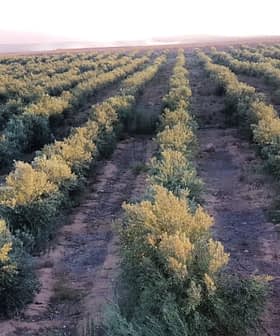Olive Farming Around the 'Navel of the World'
After years of decline and neglect, olive farming and oil production are making a comeback in the historic Greek region.
This year’s estimate for the olive production of the plain of Delphi, which is named after the historic oracle of Apollo and thought by ancient Greeks to be the navel of the world, is rather disappointing.
When drought slashes yields, the owners of the olive groves are disappointed and turn to urban jobs, which are more lucrative, resulting in a large part of the olive grove, being neglected.
Olive farming, whose importance to the local economy is only second to tourism, has shown anaemic growth and the current estimate of 4,000 tons is just one-third of the potential capacity of the region.
Despite being the third most exported variety and a registered Product of Designated Origin (PDO) the local olive known as ‘Konservolia’ or Amfissa, named after the town perched on the verdant slopes of Mt Parnassus, was until recently shipped by the cooperative in large barrels to foreign destinations.
See Also:Olive Oil ProductionProblems such as low productivity, a lack of quality control, absence of processing facilities, the neglect and abandonment of land and the lack of irrigation have accumulated and presented obstacles holding back development and threatening economic viability of the oldest and single largest unified olive grove in the country.
However, things have started to look up in the past few years, in part due to the initiative launched by the Cooperative of Amfissa to modernize olive farming through European and national programs.
These programs are aimed at improving the quality of production and upgrading of the cooperative’s facilities in order to help unleash the economic potential of the olive grove of Delphi.
How Delphi got left behind
The decline in the production of the PDO ‘Amfissa’ olive started in the 1980s.
“The olive grove has a strong production capacity, but yields still depend on the weather and rainfall, because unfortunately most of the olive groves are not irrigated,” Elias Xiros, President of the Cooperative of Amfissa, said. “When drought slashes yields, the owners of the olive groves are disappointed and turn to urban jobs, which are more lucrative, resulting in a large part of the olive grove, being neglected.”
Local experts point out that up to 30 percent of the olive grove is not cultivated systematically, while more than 70 percent is not irrigated.
Xiros also added: “The natural black olive of Delphi has special management needs, it is a mature fruit and has to be transported with great care because unlike green olives that are woody, its flesh is soft. For this reason, and because the price of the olives was not always attractive, many growers sold their olives to the presses to produce olive oil.”
Smaller packaging increases producer prices
The new investment in the ultra-modern facilities of the Cooperative of Amfiss, which have been in operation since 2017, have created new prospects for the Amfissa olives.
Until 2017, the ‘Konservolia’ olives were shipped in 150 kilogram barrels or 13 kilogram cans, with the producer price standing at about €1.40 ($1.60) per kilogram.
However, with the new packaging lines that are part of the processing unit, the Cooperative can now trade green or black olives in small packages.
“This year we expect to receive 800 to 900 tons in the new plants and we can pack 200 to 300 tons in a glass jar or plastic packaging starting from 120 grams up to the size that the customer may require,” Xiros said. “Standardization can raise the producer price to about €1.80 to €1.90 ($2.06 to $2.17) per kilo for members of the Cooperative.”
Improving production step by step
Over the last decade, the Cooperative of Amfissa has been busy improving farming practices and processing procedures through national and European Union-funded projects, of which the most important was the three-year program carried out between 2015 and 2018 focusing on traceability.
“As shoppers demand more information about the food they buy, a program was launched that allows us to keep in touch with the new market needs and step up the effort of accounting for each stage of production of the olives we produce,” Peggy Karageorgou, an agronomist of the Cooperative who is responsible for the three-year program, said.
“We currently have records for each batch of olives we receive as well as for the tanks in which they are stored,” she added. “At the packaging stage we select and create records for the fruit as well as all inputs that are used in each package. Thus, at any time, the Cooperative has access to information regarding contents of each tank, and can, if necessary, trace the product down to the producer that sourced the olives. This means we have greater ability to carry out more targeted quality controls.”
Resources from the same program also were used to train and certify around 580 members of the Amfissa Cooperative in good farming practices.
In addition, the infrastructure of the processing unit was upgraded and a color separator was acquired to improve quality control procedures.
Irrigation work in progress
A major irrigation project, which is currently underway, is expected to further improve prospects of the olive grove of Delphi.
The project envisages underground pipelines of 105 miles, of which approximately 62 miles have already been installed, with two points of abstraction from the Mornos pipeline to Amfissa and Chrysos.
The value of the project amounts to €20 million ($22.9 million) and there has been a delay of two years in its delivery.
Following a modification of the original study and the relevant contract, according to Vaggelis Katsagounos, the Deputy Chief of Staff of the Prefecture of Fokida, the project, which is co-funded by the EU, is scheduled to be completed by the end of 2019.
Olive Oil Times and the Greek publication Agronews are working together to bring you agricultural news from Greece.








